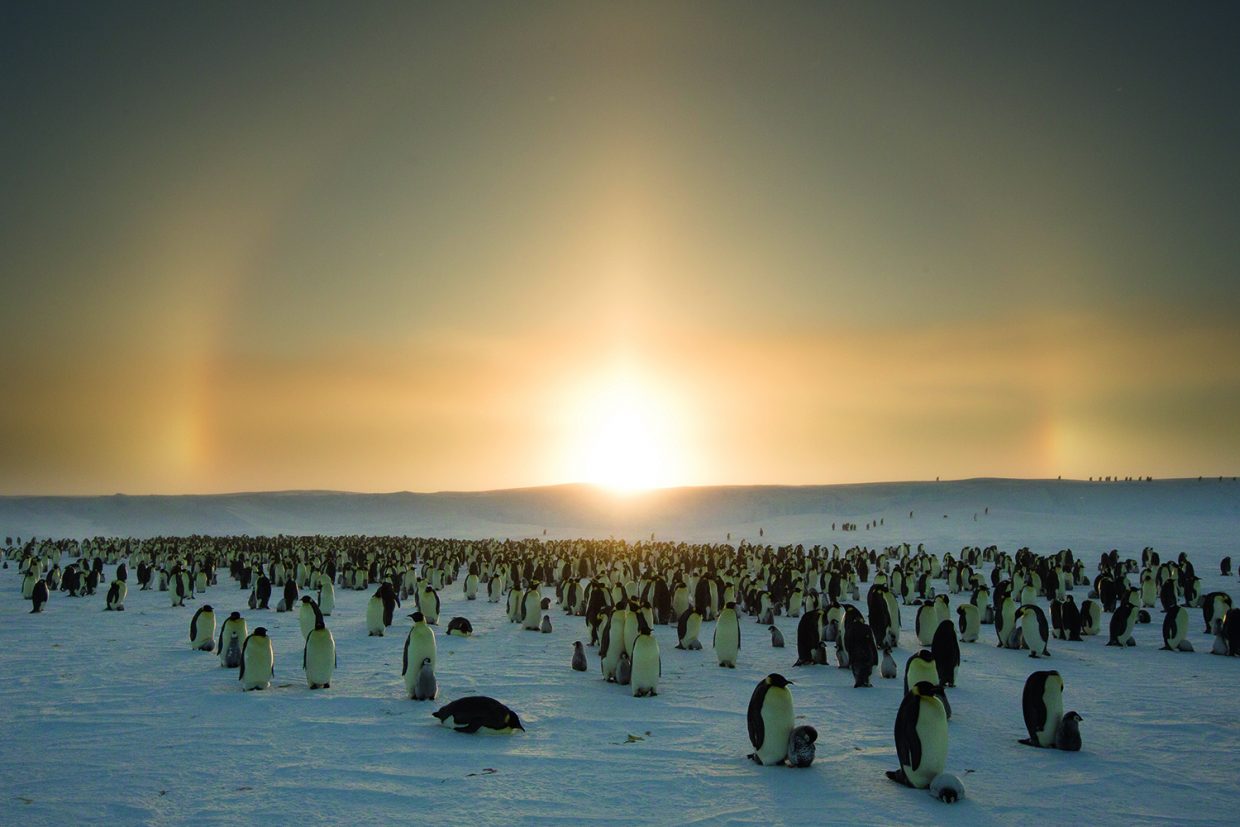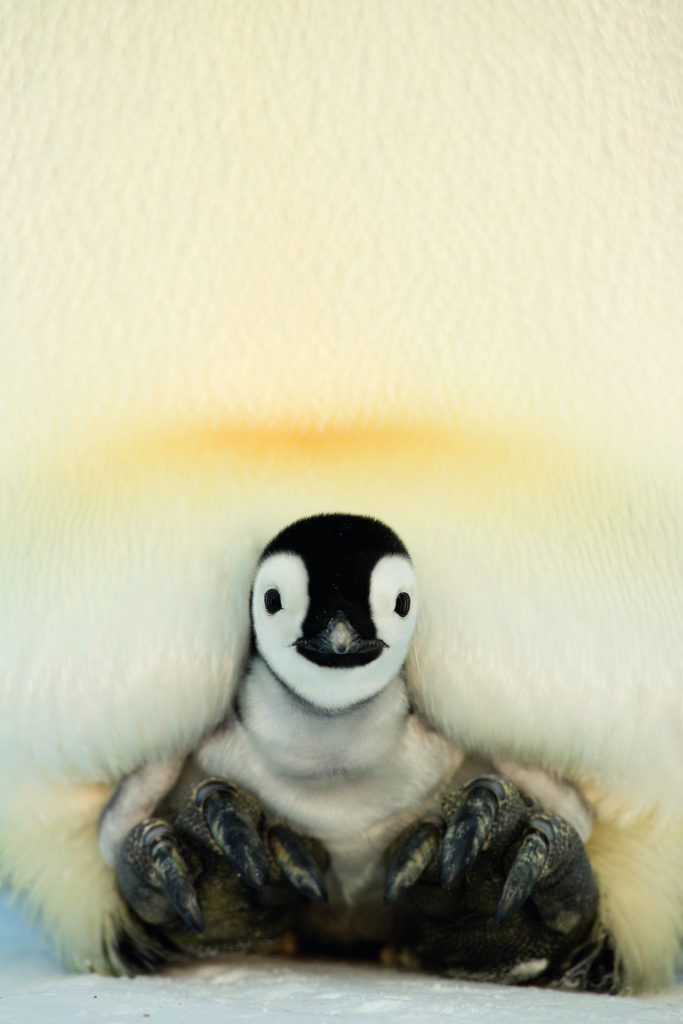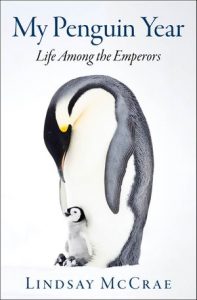
When the Baby Penguins Come
Into the World
Lindsay McCrae on Filming New Life in Antarctica
Following more than ten days of brutal, relentless Antarctic wind, the weather finally cleared overnight and we were free to make our way back down to the penguin colony. Yet again the first half an hour was spent digging out the skidoos, this time with the help of some of the other guys. All three machines were completely submerged under snow. A large snowcat parked either side of our three skidoos usually acted as a bit of protection from the wind but this time the snow had completely filled the gap. The snow was dry and soft and each heaped shovelful weighed next to nothing. It felt as if each shovelful was empty.
Although the remains of the track down to the birds appeared non-existent, amazingly the cane flags still marked every hundred meters of the six-kilometer route. The edges of the flags’ fabric had become frayed but unbelievably all but a couple of the tall canes stood undamaged. The force of the storm had snapped just two and it impressed me what they’d managed to withstand. Despite the track being covered over with soft fresh snow, the solid base underneath, which we’d driven up and down and flattened so many times, remained. As the skis of my skidoo glided through the loose mounds it felt as if I was driving on a smooth, newly ploughed path.
Within ten minutes I could see the eight flags that marked out our ramp down onto the sea, but to get my first view of the colony in nearly two weeks, I diverted off the track towards an elevated edge of the shelf; both Stefan and Will followed. With such an extended period of strong winds having prevented me from observing the colony, I’d expected the birds to have been pushed right up to the base of the ice cliff, effectively to a dead end. As I slowed, both Will and Stefan’s skidoos came up alongside mine, all three of us eager to get a glimpse of the colony. Despite having had only a few weeks above the horizon since its two-month absence, the sun was already sitting bright and high above us. The wind, however, hadn’t completely eased off. Every now and then light gusts erupted, blowing up loose snow into small plumes, spiraling them into the air.
As we slowly came to a halt near the edge, the mass of penguins below began to appear from behind the ridge. The moment all three skidoos stopped, the ghostly figure of a snow petrel glided across in front of us. It was the first sign of life, other than the emperor penguins and Weddell seals, that we had seen in nearly four months. As it turned its wings and circled around us just millimeters above the ice I wondered where it had been and how it had coped with a winter at sea. Had it been accompanying the female emperors fishing? Conditions must have been horrendous, yet its beautiful elegance showed no trace of what it had endured. Its white plumage didn’t have a blemish on it.

It began to glide back along the shelf edge and I turned off my engine and returned my focus to the penguins. Will and Stefan did the same; all three of us sat on our skidoos overlooking the colony, which lay about a hundred meters away across the sea ice. They hadn’t moved as far as I’d predicted and within an instant the sound of calling penguins hit me. Having been silent for the best part of three months the cacophony of serenading emperors had been restored. Having had no reason to make any noise over the dark depths of winter, what had changed all of a sudden?
I scrambled the camera with its long lens and surveyed the distant birds through it. Some were scattered individually around the periphery of the colony. Others, with their heads down, huddled against the cold. Even though the majority of the colony remained tightly packed, the area the colony occupied on the ice was larger than I’d seen since the birds had mated. I pulled down my balaclava, exposing my nose and mouth, and lifted up the flaps of my hat so I could hear the colony in more detail. I’d missed the sound of calling emperors.
As I looked north to try to catch one last glimpse of the snow petrel heading back in the direction of open water, my eyes were distracted. On the horizon, blurred against the face of a distant iceberg, were black specks. Highlighted against pure white, they stood out. There had been nothing in the north since the females had left at the end of May. At first I was confused. Had the storm wreaked so much havoc that hundreds of eggless male penguins had left the colony? Was the colony calling in celebration of the return of good weather? I placed my large mitt-covered hands up against the side of my head to funnel the sound directly towards my ears.
Chicks! Other than on the television, I’d never heard the sound of a newly hatched emperor chick, but its begging call was unmistakable. I shouted to Will and Stefan and listened again, the mass of trumpeting birds making it tricky to hear any other calling chicks. Nothing. I began to wonder if my ears and eyes were playing tricks on me and I had got this all wrong. Looking into my viewfinder, I scoured the nearest edge of the colony, using the camera as a substitute for my binoculars. Panning slowly from right to left, my eyes quickly assessed every bird I could see.

One bird grabbed my attention; he was leaning forward and concentrating on his brood pouch. I locked the head of the tripod in position and stared at his feet. Being a few hundred meters away the adult bird was small in my frame and I couldn’t zoom in any closer. I watched intently. As other penguins shuffled by, he maintained his concentration. All of a sudden, a chick appeared, poking its head out from between its father’s feet. It was my first distant view of a baby emperor penguin. Despite arriving during an incredibly challenging storm, chicks had been successfully hatching. I couldn’t believe it. Weighing in at only 200–400 grams and with only a very thin layer of down, the chicks didn’t have the capacity to keep themselves warm; they had done well to survive their first major challenge.
Desperate to get down and closer, we rushed the equipment back into its dedicated boxes. For ease, I held the camera on my seat between my legs rather than disassembling it and, using my spare hand, I drove down the ramp onto the flat sea ice. There were penguins everywhere so, keeping tight against the cliff of ice, we drove along the bottom edge of the shelf to a position just below where we’d been sitting and watching. Being closer to the birds I was able to look at each one in more detail. I couldn’t see the individual I’d just had my camera focussed on but a lot more males were showing signs of being fidgety. My eyes didn’t leave their feet as I searched for signs of new life amongst the thousands of birds that stood in front of me.
Being down at the same level as the penguins, I could barely hear myself think, the characteristic trumpeting from hundreds of calling individuals creating a deafening choir.
Being down at the same level as the penguins, I could barely hear myself think, the characteristic trumpeting from hundreds of calling individuals creating a deafening choir. Again, I was keen to film events in chronological order. Having seen one chick, I knew there must have been more, but it also meant somewhere there must be eggs in the process of hatching. Copulating had taken place over a two-week period and possibly for a week or two before that, when I’d not had access on to the sea ice. So long as the weather held I had at least another ten days of the hatching process in which to capture the magical moment of a chick breaking its way out of the egg. It was potentially one of the most intimate occasions during the emperors’ year and I simply had to record it.
I continued to monitor each agitated male bird in the hope they’d give me a glimpse of their precious egg. As they had been throughout the winter, they were very reluctant to expose their treasure, especially now that they had managed to deliver it unharmed to such a vital stage of the process. The birds were more active than I’d seen for a while. The improvements in the weather allowed them to stand apart from each other, which meant gaps allowed me to focus on birds deeper into the group.
I clocked an emperor between two others behaving in a similar manner to the one I’d seen from the top of the cliff. I watched him in detail in the hope I’d get a glimpse of his egg. Constantly preening the outer edge of his brood pouch, he appeared extremely unsettled. None of the males had given their feathers this much attention since just before receiving the egg from the female back in May. Running the end of his bill from the base of each feather along to the tip, he arranged each one, making sure they were in perfect condition. Despite the white feathers around his feet being so close to the ground (and the backsides of other penguins) they appeared pristine and whiter than the snow. It amazed me how clean he’d managed to keep them without entering any water to clean them off.
With no warning he rapidly uncurled his plumage. With his egg exposed, resting on his scaly feet, he gently rolled it around, readjusting its position using the tip of his beak. One by one, his long white feathers folded back down, hiding the egg again. Immediately the emperor lifted his pouch once more. I zoomed right in to grab a close-up shot, the mango-sized egg filling my viewfinder. Right in the center was a long crack and a small hole, with the tip of a chick’s beak poking out. As it chipped its way around the inside of the egg to break out, it chirped through the hole it had made. I could see its tongue as it made its father aware it was trying to break free. Falling into frame, the male emperor’s bill gently made contact for the first time with his new chick. It was a magical moment and one that I will treasure forever.

For over two hours I patiently sat watching and waiting for my opportunity to record the chick’s emergence. This was my chance and I didn’t want to miss it. Each time the male revealed his egg, the crack had deepened and the shell was a little more open. The tiny chick, who had been chipping away at the inside of the shell for the previous 24 hours, was finally able to lift the lid and prise itself out. With large parts of shell falling away onto the ice and the soft membrane flapping in the light breeze, the young and weak emperor uncurled its folded neck. Covered in a damp, delicate layer of light-grey downy feathers, its skin showed through, making it appear naked.
Almost immediately the chick mustered enough strength to lift its head above its body and instinctively begged to its father for food. As he had not eaten for well over a hundred days, I was unsure he would be able to offer his chick anything. He’d fought numerous horrendous ten-day-long storms, moved on two occasions across the sea ice to a safer location and had been forced to his physical limits to maintain his own body heat to survive. His diminishing energy levels couldn’t have supported him for much longer. Yet, standing upright, he appeared to be trying to muster something for his chick. He elongated his neck upwards, throwing his beak forwards. His neck went into spasm, forcing his wings to repeatedly lift up and out away from his body and back down. It reminded me of a child’s toy.
Bending over, he gently offered his open beak to his chick, triggering an impulse in the chick to open its beak wide. Lifting itself as high as possible, the chick stuck its entire head into its father’s mouth. From behind his spiny tongue the male regurgitated a thick creamy substance. I couldn’t believe what I was seeing. Had the male really managed to store away food just for this moment? Surely after such a long period the food would be off? It fell down into the chick’s mouth, its weight and gravity taking the chick’s head with it. It was an almost comical sight. Half was swallowed, half fell onto the ice, immediately freezing and becoming encased in a silver crust.
Having received its first feed, the chick rested its head on its father’s feet as he covered it with his feathers. I sat up. I had been leaning over with my eye glued to the camera and my neck was as stiff as the chick’s must have felt. I watched as the parent settled down again, the chick disappearing under his heavy coat of feathers. The father closed his eyes, knowing he had done all the hard work of bringing the next generation into the world.
Looking over the colony at the distant birds that I’d seen from the elevated clifftop, it suddenly dawned on me. I grabbed my binoculars and looked across the horizon. Tens then hundreds of emperors appeared. The females were returning. Timed to incredible perfection, fat, healthy, colorful females were on their way back to the colony after their sixty or so days at sea. How, just how, had they managed to return at exactly the same time as the chicks were hatching? Unlike when the entire colony had marched in great long lines across the fresh sea ice, the females were tobogganing on their bellies individually. Rather than traveling in long lines, they were trickling back towards the group of males, with birds arriving into the colony every few minutes or so. Some arrived two or three at a time, others on their own, but looking out towards open sea there was a constant flow of penguins.

As they propelled their bellies across the fluctuations in the snow caused by the patterns of sastrugi, their bodies disappeared and reappeared behind ridges. I could see the fat they had put on over the winter ripple down their flanks as they powered ever closer. With their heads up above the snow, calling as they approached, a cloud of breath evaporated in the air as they slid underneath it. They were traveling at an incredible rate towards the colony. I changed position to try to capture a female returning back into the main group. I was desperate to see her reaction when she caught the first glimpse of her newly hatched chick.
All images by the author.
________________________________________

From My Penguin Year: Life Among the Emperors. Used with permission of the publisher, William Morrow. Copyright 2019 by Lindsay McCrae.
Lindsay McCrae
Lindsay McCrae won the 2019 BAFTA Award for factual photography. Raised in England's Lake District, he has been filming wildlife professionally for more than ten years, from Alaska to Antarctica, from the Scottish Highlands to the rainforests of Indonesia. He was director of photography on BBC Studios's Dynasties: Emperor, narrated by Sir David Attenborough. His book My Penguin Year is out now from William Morrow.












